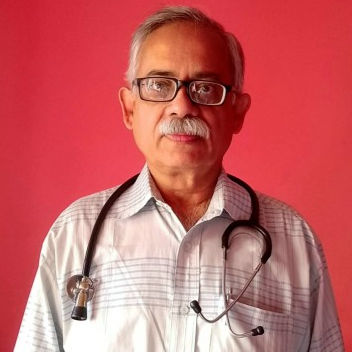How To Reduce Iron Deficiency?
Learn effective ways to combat iron deficiency. Discover dietary tips, how to boost absorption, and when to consider supplements and medical advice.

Written by Dr.Sonia Bhatt
Last updated on 13th Jan, 2026
.webp?tr=q-80,f-webp,w-350,dpr-2,c-at_max 700w)
Iron deficiency is one of the most common nutritional deficiencies worldwide, affecting millions of people. If left untreated, it can lead to anemia, fatigue, and other health complications. The good news is that iron deficiency can often be managed and corrected with the right diet, supplements, and lifestyle changes.
What Is Iron Deficiency?
Iron is a vital mineral that helps produce hemoglobin, a protein in red blood cells that carries oxygen throughout the body. When your body lacks enough iron, it cannot make sufficient healthy red blood cells, leading to iron deficiency anemia.
Symptoms of Iron Deficiency
Depending on the type of infection, symptoms may include:
Fatigue and weakness
Pale skin
Shortness of breath
Dizziness or lightheadedness
Cold hands and feet
Brittle nails
Unusual cravings for nonfood items (like ice or dirt, known as pica)
Frequent headaches
If you experience these symptoms, it’s important to consult a doctor for proper diagnosis and treatment.
Consult Top Doctors for Your Symptoms
Causes of Iron Deficiency
Several factors can contribute to low iron levels, including:
Poor Dietary Intake: A diet lacking sufficient iron-rich foods can lead to inadequate iron levels in the body.
Blood Loss: Significant blood loss from heavy menstruation, ulcers, or internal bleeding depletes the body's iron stores.
Pregnancy: The increased iron demands during pregnancy to support fetal growth and development can lead to deficiency if intake isn't increased.
Digestive Disorders: Conditions such as celiac disease or Crohn’s disease can interfere with the body's ability to absorb iron from food.
Vegetarian or Vegan Diets: Plant-based sources of iron (nonheme iron) are not as readily absorbed by the body compared to iron from animal products (heme iron).
How to Increase Iron Levels Naturally
To increase iron levels naturally the following can be followed:
1. Eat Iron-Rich Foods: Include heme iron sources like red meat, poultry, fish, and eggs, and nonheme iron sources such as spinach, lentils, nuts, fortified cereals, and whole grains in your diet.
2. Boost Iron Absorption with Vitamin C: Enhance nonheme iron absorption by pairing iron-rich foods with vitamin C sources like oranges, lemons, bell peppers, strawberries, and tomatoes.
3. Avoid Iron Blockers: Limit coffee, tea, dairy products, and high-fiber foods during iron-rich meals as they can hinder iron absorption.
4. Cook in Cast Iron Pans: Cooking acidic foods in cast iron can naturally increase the iron content of your meals.
5. Consider Iron Supplements: If diet isn't sufficient, your doctor might suggest iron supplements; take them on an empty stomach with vitamin C, and avoid consuming them with calcium or antacids.
When to See a Doctor
If you suspect iron deficiency, consult a healthcare provider. They may recommend:
A blood test to check iron levels (hemoglobin, ferritin)
Prescription iron supplements if needed
Further tests to identify underlying causes (like internal bleeding)
For severe cases, iron infusions may be necessary.
Prevention Tips
The following are the preventive tips which could be followed:
Regular Checkups: Get your iron levels checked regularly, particularly if you have risk factors for deficiency.
Balanced Diet: Ensure your diet includes a variety of both easily absorbed heme iron and plant-based nonheme iron sources.
Manage Blood Loss: If you experience heavy menstrual bleeding, discuss management strategies with your healthcare provider.
Need Help? Consult a Specialist
If you're struggling with iron deficiency symptoms, don’t ignore them. Early intervention can prevent complications. You can book a consultation with a nutritionist or hematologist through Apollo 24|7 for personalized advice and treatment.
Conclusion
Iron deficiency is treatable with the right approach. By making smart dietary choices, improving absorption, and seeking medical guidance when needed, you can restore your iron levels and feel healthier. For expert advice, schedule a consultation today on Apollo 24|7. Take care of your health—your body will thank you!
Consult Top General Physicians
Consult Top Doctors for Your Symptoms

Dr. Rajib Ghose
General Physician/ Internal Medicine Specialist
25 Years • MBBS
East Midnapore
VIVEKANANDA SEBA SADAN, East Midnapore

Dr. Tanzeem Shajahan
General Physician/ Internal Medicine Specialist
7 Years • MBBS, MD (General Medicine)
Bengaluru
Medwin multispeciality clinic, Bengaluru

Dr. Khuda Baksh Nagur
General Physician/ Internal Medicine Specialist
11 Years • MBBS, MD (GENERAL MEDICINE), Certificate Programme clinicians in Diabetes Management
Bengaluru
Medwin multispeciality clinic, Bengaluru
(25+ Patients)

Dr. Pinaki Mukhopadhyay
General Physician/ Internal Medicine Specialist
33 Years • MBBS
Kolkata
MCR SUPER SPECIALITY POLY CLINIC & PATHOLOGY, Kolkata
(25+ Patients)

Dr. Uddalak Chakraborty
Neurologist
8 Years • MBBS, MD(GENL.MED.),DM(NEUROLOGY)
Kolkata
MCR SUPER SPECIALITY POLY CLINIC & PATHOLOGY, Kolkata
Consult Top General Physicians

Dr. Rajib Ghose
General Physician/ Internal Medicine Specialist
25 Years • MBBS
East Midnapore
VIVEKANANDA SEBA SADAN, East Midnapore

Dr. Tanzeem Shajahan
General Physician/ Internal Medicine Specialist
7 Years • MBBS, MD (General Medicine)
Bengaluru
Medwin multispeciality clinic, Bengaluru

Dr. Khuda Baksh Nagur
General Physician/ Internal Medicine Specialist
11 Years • MBBS, MD (GENERAL MEDICINE), Certificate Programme clinicians in Diabetes Management
Bengaluru
Medwin multispeciality clinic, Bengaluru
(25+ Patients)

Dr. Pinaki Mukhopadhyay
General Physician/ Internal Medicine Specialist
33 Years • MBBS
Kolkata
MCR SUPER SPECIALITY POLY CLINIC & PATHOLOGY, Kolkata
(25+ Patients)

Dr. Uddalak Chakraborty
Neurologist
8 Years • MBBS, MD(GENL.MED.),DM(NEUROLOGY)
Kolkata
MCR SUPER SPECIALITY POLY CLINIC & PATHOLOGY, Kolkata
